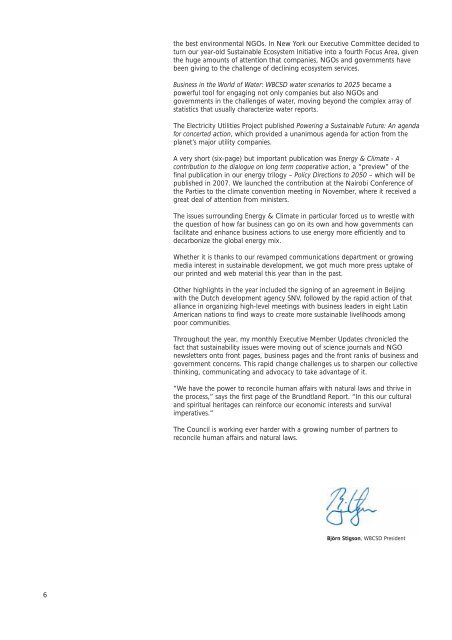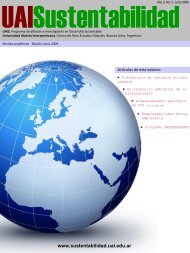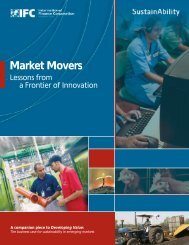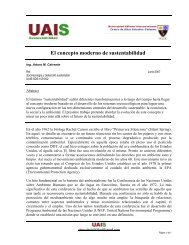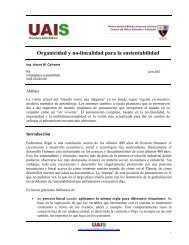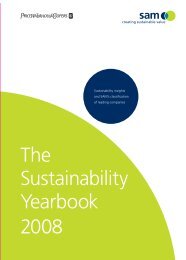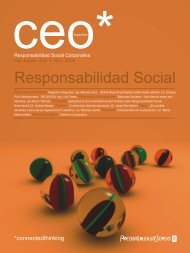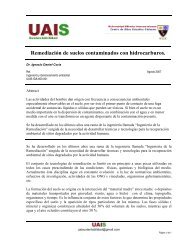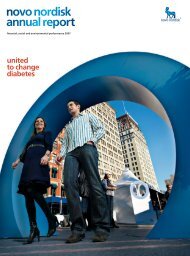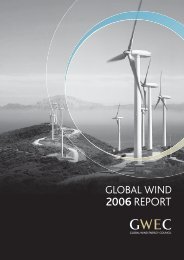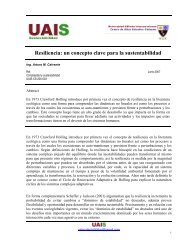WBCSD Annual Review 2006 NEW.qxp - Sustentabilidad.uai.edu.ar
WBCSD Annual Review 2006 NEW.qxp - Sustentabilidad.uai.edu.ar
WBCSD Annual Review 2006 NEW.qxp - Sustentabilidad.uai.edu.ar
Create successful ePaper yourself
Turn your PDF publications into a flip-book with our unique Google optimized e-Paper software.
the best environmental NGOs. In New York our Executive Committee decided to<br />
turn our ye<strong>ar</strong>-old Sustainable Ecosystem Initiative into a fourth Focus Area, given<br />
the huge amounts of attention that companies, NGOs and governments have<br />
been giving to the challenge of declining ecosystem services.<br />
Business in the World of Water: <strong>WBCSD</strong> water scen<strong>ar</strong>ios to 2025 became a<br />
powerful tool for engaging not only companies but also NGOs and<br />
governments in the challenges of water, moving beyond the complex <strong>ar</strong>ray of<br />
statistics that usually ch<strong>ar</strong>acterize water reports.<br />
The Electricity Utilities Project published Powering a Sustainable Future: An agenda<br />
for concerted action, which provided a unanimous agenda for action from the<br />
planet’s major utility companies.<br />
A very short (six-page) but important publication was Energy & Climate - A<br />
contribution to the dialogue on long term cooperative action, a “preview” of the<br />
final publication in our energy trilogy – Policy Directions to 2050 – which will be<br />
published in 2007. We launched the contribution at the Nairobi Conference of<br />
the P<strong>ar</strong>ties to the climate convention meeting in November, where it received a<br />
great deal of attention from ministers.<br />
The issues surrounding Energy & Climate in p<strong>ar</strong>ticul<strong>ar</strong> forced us to wrestle with<br />
the question of how f<strong>ar</strong> business can go on its own and how governments can<br />
facilitate and enhance business actions to use energy more efficiently and to<br />
dec<strong>ar</strong>bonize the global energy mix.<br />
Whether it is thanks to our revamped communications dep<strong>ar</strong>tment or growing<br />
media interest in sustainable development, we got much more press uptake of<br />
our printed and web material this ye<strong>ar</strong> than in the past.<br />
Other highlights in the ye<strong>ar</strong> included the signing of an agreement in Beijing<br />
with the Dutch development agency SNV, followed by the rapid action of that<br />
alliance in organizing high-level meetings with business leaders in eight Latin<br />
American nations to find ways to create more sustainable livelihoods among<br />
poor communities.<br />
Throughout the ye<strong>ar</strong>, my monthly Executive Member Updates chronicled the<br />
fact that sustainability issues were moving out of science journals and NGO<br />
newsletters onto front pages, business pages and the front ranks of business and<br />
government concerns. This rapid change challenges us to sh<strong>ar</strong>pen our collective<br />
thinking, communicating and advocacy to take advantage of it.<br />
“We have the power to reconcile human affairs with natural laws and thrive in<br />
the process,” says the first page of the Brundtland Report. “In this our cultural<br />
and spiritual heritages can reinforce our economic interests and survival<br />
imperatives.”<br />
The Council is working ever h<strong>ar</strong>der with a growing number of p<strong>ar</strong>tners to<br />
reconcile human affairs and natural laws.<br />
Björn Stigson, <strong>WBCSD</strong> President<br />
6


